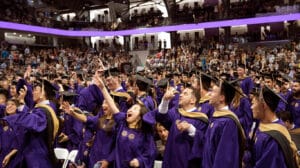McKinsey, BCG and Bain, collectively referred to as ‘MBB’, are widely recognized as the top management consultancy firms in the world. Each has well-established operations in several cities across the US.
This article will focus only on the Washington, DC offices of McKinsey, BCG and Bain, and will answer some of the top-of-mind questions for potential candidates. Questions like:
- What kind of candidates are recruited by McKinsey, BCG and Bain’s Washington, DC offices?
- Which undergraduate universities give you the highest chances of getting into the Washington, DC offices of McKinsey, BCG or Bain?
- Is an MBA a good route to management consulting in Washington, DC?
- Is there an entry path to the Washington, DC offices of McKinsey, BCG or Bain from other industries?
The insights in this article come from a detailed analysis of over 250 individuals hired by McKinsey, BCG and Bain for client-facing consulting roles in their Washington, DC offices from 2020 to mid-2022.
Key takeaways
- In MBB’s Washington, DC offices, 41% of hires are pre-experience students and 36% are MBA hires. 17% are experienced professionals and 6% are advanced degree candidates.
- There are fewer new hires in Washington, DC than in other major locations in the US (e.g. New York, Boston, Chicago, San Francisco).
- McKinsey and BCG’s Washington, DC offices hired similar numbers of consultants between Q1 2020 and Q2 2022. Both firms hired close to twice as many consultants as Bain in the same period.
- 57% of hires by McKinsey, BCG and Bain’s Washington, DC offices were male, signaling some room for improvement in gender parity in hiring.
- MBB’s Washington, DC offices are open to a variety of candidates. Their pre-experience student and MBA hiring in Washington, DC featured a balanced mix of candidates from nationally top-ranked universities in the North East, strong neighboring universities, and a broad range of other US universities.
- Five universities – Georgetown University (21%), Duke University (10%), Harvard University (8%), University of Virginia (6%) and Massachusetts Institute of Technology (6%) – supply over half (51%) of pre-experience student hires into MBB’s Washington, DC offices.
- Five schools – the Wharton School (15%), Darden School of Business (14%), Harvard Business School (11%), Fuqua School of Business (9%) and MIT Sloan School of Management (9%) – supply over half (56%) of MBA hires into MBB’s Washington, DC offices.
- If you did not study (at bachelor’s or master’s level) at a target US undergraduate or master’s program, an MBA at the top US programs highlighted in this article is your best route to breaking into MBB’s Washington, DC offices.
The main sources of candidates for top consulting firms’ Washington, DC offices
Hiring in MBB’s Washington, DC offices mirrors the US average
MBB’s offices in Washington, DC have broadly similar recruitment channel outcomes as the US as a whole, with a maximum of only four percentage points of difference across all channels.
In MBB’s Washington, DC offices, 41% of hires are pre-experience students and MBA hires constitute 36% of the total. Experienced professionals make up 17% and advanced degree candidates only make up 6%.
Overall, there are fewer hires in Washington, DC than in other major locations in the US, such as New York, Boston, Chicago, San Francisco.
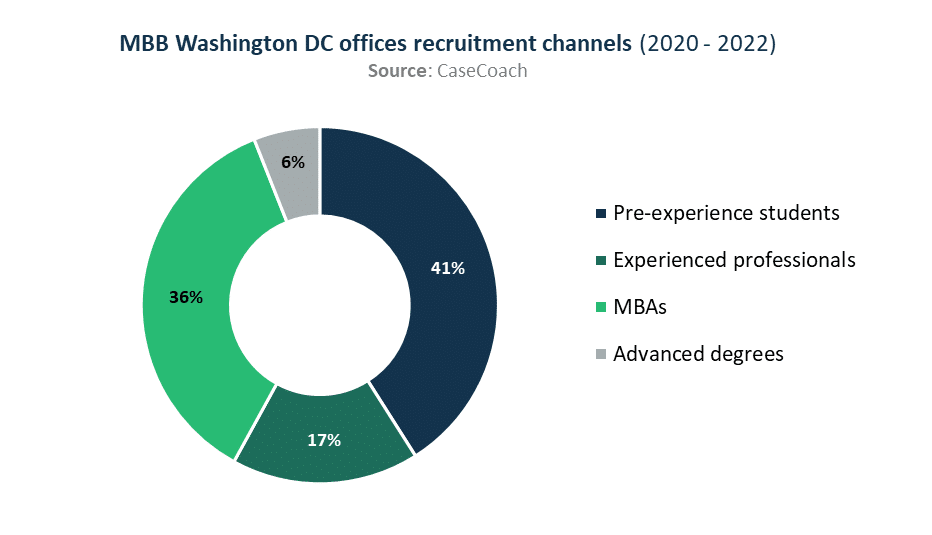
To understand these categories better, here are quick definitions:
- Pre-experience students (bachelor’s degree or a non-MBA master’s degree) are hired out of university or shortly after. They typically have no more than two years of experience and are hired into entry-level roles (i.e. Business Analysts at McKinsey, Associates at BCG and Associate Consultants at Bain).
- MBA hires are graduates of a one or two-year MBA program. They typically have work experience gained before their MBAs and are hired into post-MBA roles (i.e. Associates at McKinsey and Consultants at BCG and Bain).
- Experienced hires are from other employers and typically have two to eight years of experience. Those with less are hired at pre-MBA roles (i.e. Senior Business Analysts at McKinsey, 2nd year Associate Consultants at Bain and Senior Associates at BCG). Those with significant experience are hired into post-MBA roles (i.e. Associates at McKinsey and Consultants at BCG and Bain).
- Advanced degree hires are hired during or soon (not more than two years) after their Ph.D. or medical school programs. They’re typically hired into post-MBA roles in the US (i.e. Associates at McKinsey and Consultants at BCG and Bain).
McKinsey and BCG hire more candidates than Bain
McKinsey, and BCG’s Washington, DC offices hired similar numbers of consultants between Q1 2020 and Q2 2022. Both firms hired close to twice as many consultants as Bain in the same period.
There are some disparities in the hiring mix among the three firms. Bain hired a higher proportion of pre-experience students (56%) than McKinsey (39%) and BCG (35%). However, it fired fewer experienced professionals (5%) than the other two firms (25% and 15% respectively).
MBB’s Washington, DC offices hire more men
Fifty-seven percent of hires by McKinsey, BCG and Bain’s Washington, DC offices were male, signaling some room for improvement in gender parity in hiring. While this holds true at similar levels across all three firms, the gender gap isn’t the same across all channels.
There were higher proportions of male hiring for MBAs (65% male), experienced hires (66% male) and advanced degree candidates (57% male). Only 46% of pre-experience student hires were male, however, making it the most gender-equitable channel.
Pre-experience student hiring in McKinsey, BCG and Bain’s Washington, DC offices
Pre-experience students made up 41% of total hires by McKinsey, BCG and Bain in Washington, DC from Q1 2020 to Q2 2022. This means that hires from a bachelor’s or master’s degree program (excluding MBAs) made up their largest recruitment channel for entry-level roles.
The next section will look closely at which universities the pre-experience student hires of MBB’s Washington, DC offices attended.
Where did Washington, DC MBB’s pre-experience student hires go to university?
All 35 of the universities that supplied pre-experience student hires to MBB’s Washington, DC offices are based in the US. Five universities supplied over half (51%) of these hires. They are:
- Georgetown University (21%)
- Duke University (10%)
- Harvard University (8%)
- University of Virginia (6%)
- Massachusetts Institute of Technology (6%)
In the chart below, we list the 17 universities that contributed more than 1% of hires to the total. Together, they account for 83% of pre-experience student hires. None of the three firms stood out as the most open to a variety of universities.
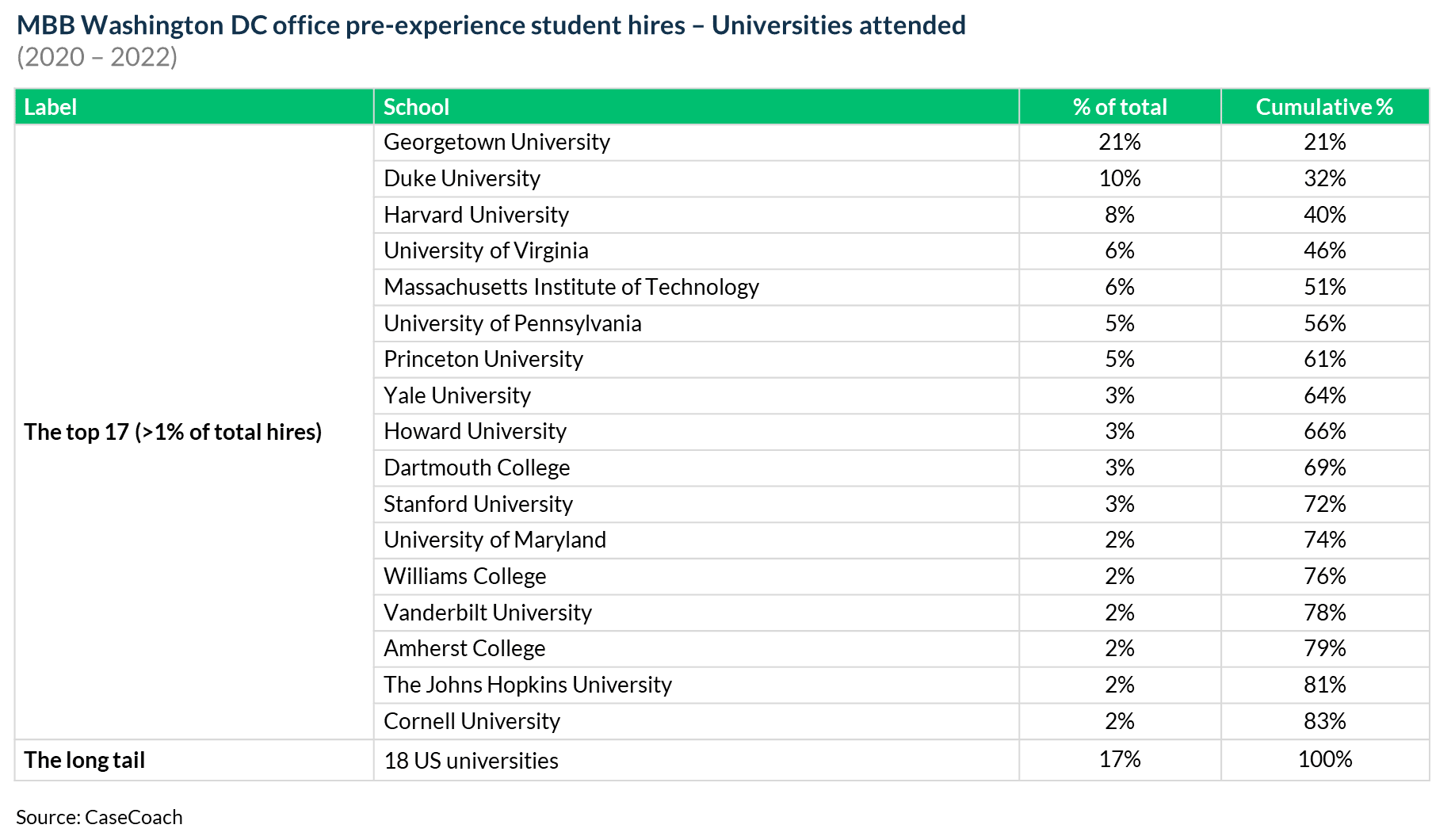
Pre-experience student hiring into MBB’s Washington, DC offices features a balanced mix of candidates from nationally top-ranked universities located in the North East (e.g. Harvard, Princeton, MIT and Yale), strong neighboring universities (e.g. Georgetown, University of Virginia and Johns Hopkins), and a broad range of other US universities.
What did Washington, DC MBB’s pre-experience student hires study?
Twenty-six percent of pre-experience student hires into MBB’s Washington, DC offices graduated with an economics degree, while 6-7% graduated with either a business administration, finance or engineering degree. The remaining pre-experienced student hires (50%+) studied a variety of disciplines.
Unlike in European offices (e.g. France and Germany), a master’s degree doesn’t seem to give candidates a distinct edge. Pre-experience students with a master’s degree made up only 24% of pre-experience students, compared with 74% without. The proportion of master’s degree holders among pre-experience student hires for Washington, DC, however, is higher than the US average of 12%.
MBA hiring in McKinsey, BCG, and Bain’s Washington, DC offices
Thirty-six percent of all hires into the Washington, DC offices of McKinsey, BCG and Bain came from an MBA program. This holds true for all three firms; MBA hires made up 35-37% of hires across the board.
As a reminder, MBA hires are graduates of a one or two-year MBA program, usually at a US business school. They typically have some work experience gained before their MBAs and are hired into post-MBA roles (i.e. Associates at McKinsey and Consultants at BCG and Bain).
For MBA hires, we will explore two questions:
- Which business schools did they attend?
- Which undergraduate universities did they attend?
Which business schools did Washington, DC MBB’s MBA hires attend?
Five schools supply over half (56%) of MBA hires into the Washington, DC offices of McKinsey, BCG and Bain. They are:
- The Wharton School (15%)
- Darden School of Business (14%)
- Harvard Business School (11%)
- Fuqua School of Business (9%)
- MIT Sloan School of Management (9%)
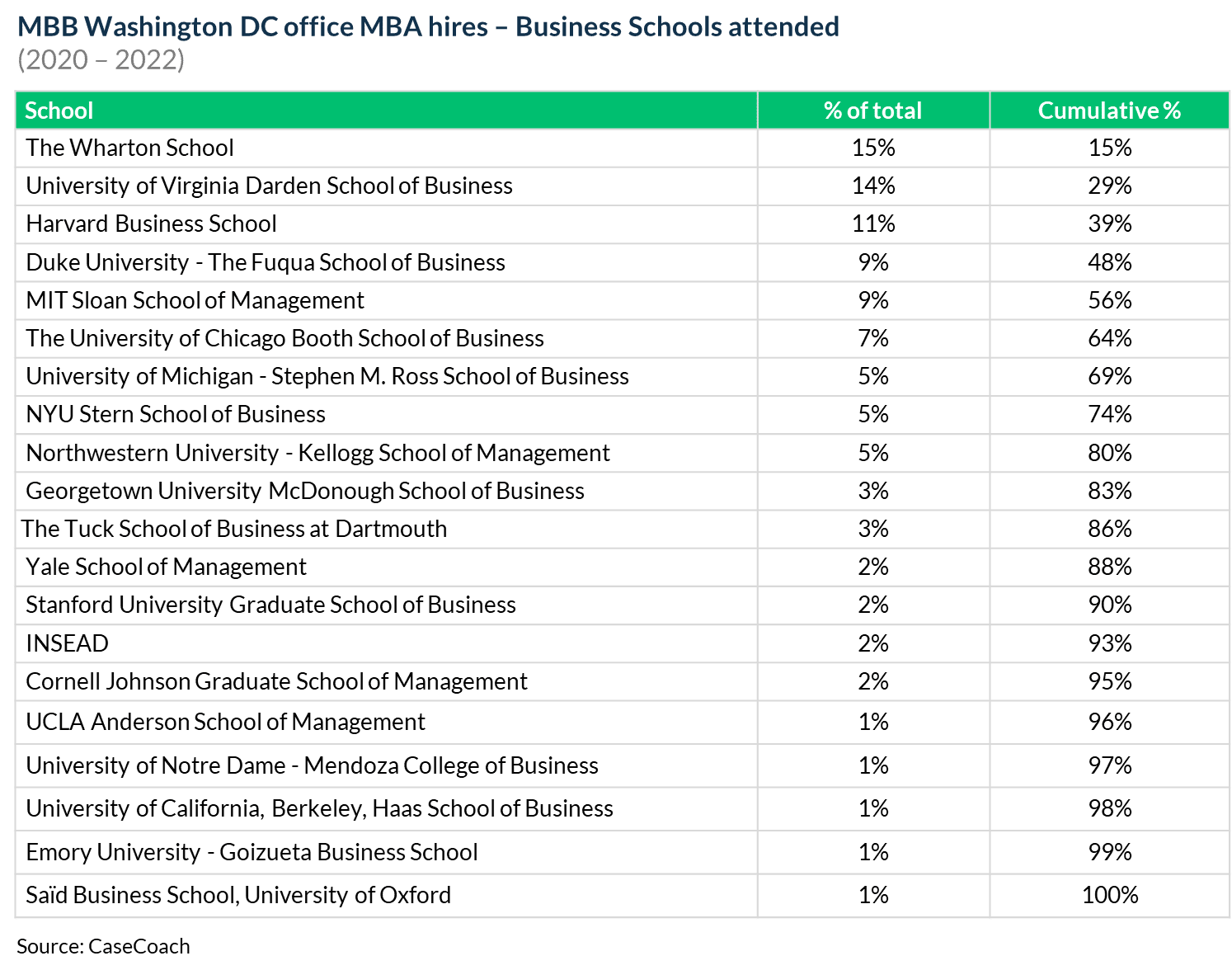
Similar to the pre-experience student channel, MBA hires come from a mix of nationally top-ranked business schools (e.g. Wharton and HBS), leading regional schools (e.g. Darden and Fuqua), and a range of other US business schools. Foreign business schools only provided 3% of MBA hires into MBB’s Washington, DC offices.
Which undergraduate universities did the MBA hires of MBB’s Washington, DC offices attend?
The MBA hires into MBB’s Washington, DC offices came from almost 70 undergraduate programs. This is a broader range of universities (about 2x) than were considered in pre-experience student hiring (with 35 universities represented), indicating more educational background openness for the MBA hiring channel.
Fourteen percent of MBA hires into MBB’s Washington, DC offices came from an international undergraduate program, making it the largest channel of entry into MBB firms in Washington, DC for international candidates.
Thus, if you did not study (at bachelor’s or master’s level) at a target US undergraduate or master’s program, an MBA at a top US program is your best route to breaking into MBB’s Washington, DC offices.
Experienced professional hiring in McKinsey, BCG and Bain’s Washington, DC offices
The ‘experienced hires’ channel, in which candidates typically have two to eight years of professional experience, was the third-largest recruitment channel for MBB’s Washington, DC offices from Q1 2020 to Q2 2022. It made up ~17% of all hires by these three firms. At McKinsey, experienced hires made up around 25% of total hires, while at BCG it was 15% and at Bain it was 5%.
Experienced hires joined top firms at different levels:
- 30% of experienced hires were recruited into pre-MBA roles (i.e. Business Analysts at McKinsey, Associate, Senior Associate Consultants at Bain and Senior Associates at BCG).
- 70% of experienced hires were recruited into post-MBA roles (i.e. Associates at McKinsey and Consultants at BCG and Bain). Candidates with team leadership experience at other consulting firms sometimes join at a more senior level, but will typically experience a small step back in seniority compared to their previous firm.
Which industries did Washington, DC MBB’s experienced hires come from?
About a third (30%) of the experienced hires into MBB’s Washington, DC offices came from other consulting firms. These included other strategy consulting firms (e.g. Oliver Wyman), the strategy teams of ‘Big-4’ accounting firms (e.g. Deloitte) and Accenture.
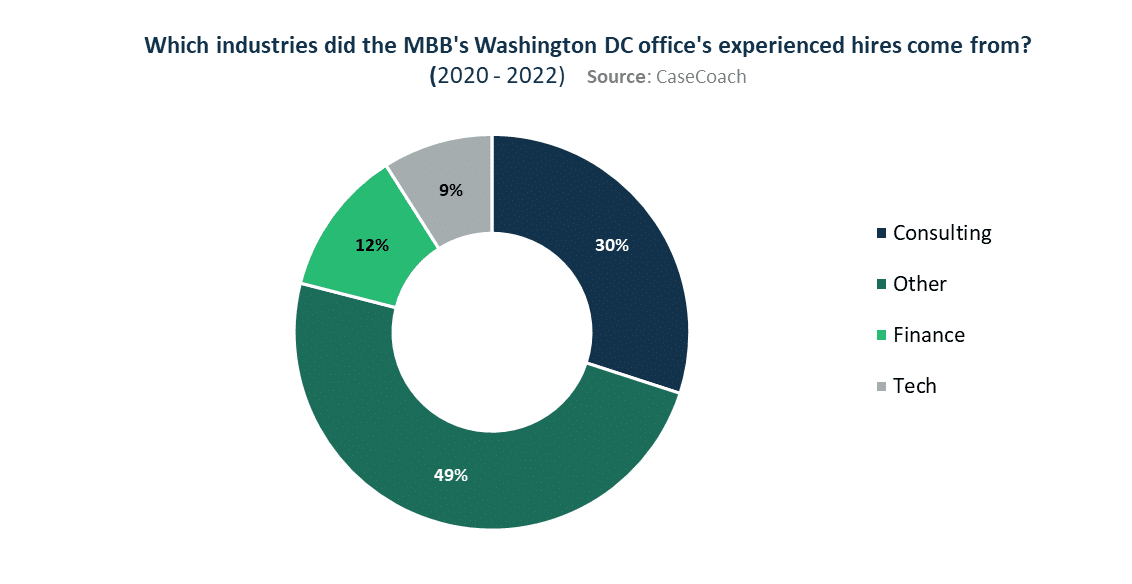
The finance industry contributed about 12% of the experienced hires into MBB’s Washington, DC offices, and tech contributed 9%. The remaining 49% came from a wide range of unrelated industries.
Where did MBB’s experienced hires go to school?
The largest five undergraduate contributors for the pre-experience student channel (Georgetown, Duke, Harvard, University of Virginia and MIT) contributed 21% of experienced professional hiring into MBB’s Washington, DC offices. This signals that, like the MBA hire channel, experienced professionals from a wider range of undergraduate programs are considered.
Only 7% of hires from the experienced hire channel had an international undergrad degree (compared with 14% for MBAs). This is likely to be driven by the lower proportion of international candidates among experienced hires compared to top US business schools, where international citizens routinely comprise half the class.
Advanced degree hiring in McKinsey, BCG and Bain’s Washington, DC offices
Advanced degree hires were the smallest proportion of total hires for McKinsey, BCG and Bain’s Washington, DC offices, making up just 6% of total hiring. They came from 12 US universities and one Canadian university, and studied a wide range of disciplines. Each university contributed a single advanced degree hire, except the University of Maryland and Carnegie Mellon University, with two hires each.
What’s next if you’d like to get into McKinsey, BCG and Bain’s Washington, DC offices
Looking to join McKinsey, BCG or Bain’s Washington, DC offices? CaseCoach has resources to guide you all the way from the resume crafting stage to your final interviews.
Our Free Resume Course provides resume and cover letter templates and specialized advice for students, MBAs, and experienced professionals.
The Consulting Interview Prep Toolkit contains all the resources you need to ace your case and fit interview, including online courses, sample interviews, case material and practice tools.
CaseCoach’s team of coaches includes former consultants and interviewers with McKinsey, BCG, and Bain. They are available to deliver case and fit interview coaching and mock interviews in a realistic setting to put your preparation to the test, providing the personal feedback and practical advice needed to ace your interviews.

